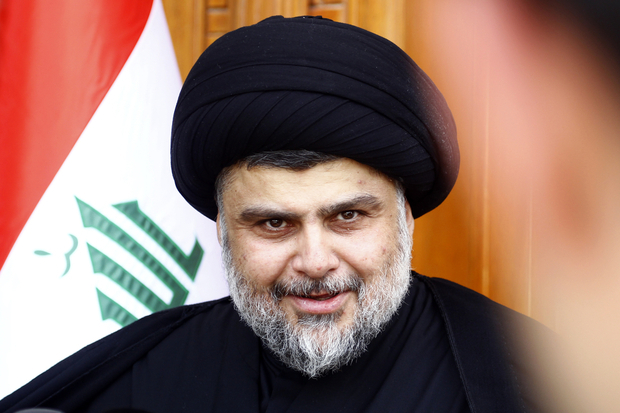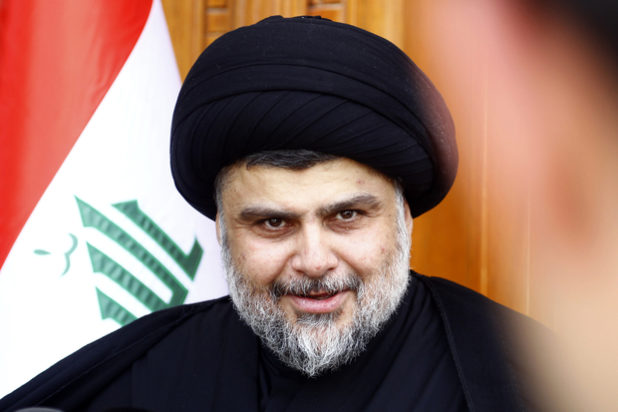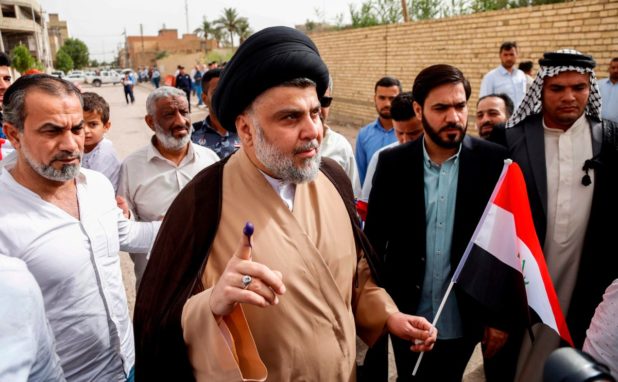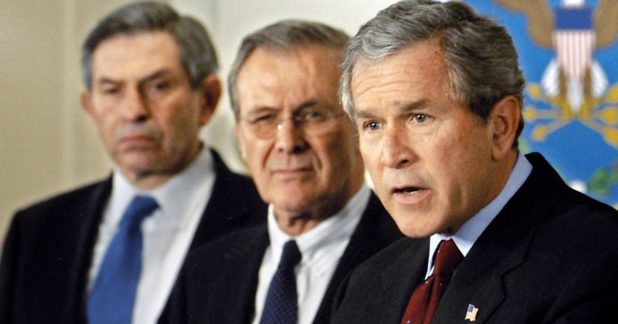Andrew Anglin
Daily Stormer
May 21, 2018
So the US invaded Iraq, spent ten years and however many American lives and trillions of dollars, ostensibly because it was an absolute moral good to bring them the absolute moral goodness of liberal democracy.
Or wait was it because Saddam did 9/11? Or that he was planning to nuke America?
It was a long time ago, I can’t remember the original thing, but I know the eventual reason was that we were bringing them democracy.
Fifteen years later, only 44% of eligible voters bothered to vote – many literally protesting the concept of democracy – and those that did vote voted for Iranian aligned Shiites and a Shiite cleric who led multiple uprisings against the US occupation.
Saddam was a lot more friendly than this new government.
Just for anyone keeping score on that particular front.
RT:
A Shia cleric with strong anti-American views is poised to become kingmaker in Iraq. Muqtada al-Sadr’s coalition emerged victorious in parliamentary elections, signaling a resurgence in Iraqi nationalism, analysts told RT.
Al-Sadr’s Sairoon Alliance capitalized on widespread anger over foreign influence and unchecked corruption in Iraq, securing a surprise victory over Iran-backed Shia militia chief Hadi al-Amiri’s Fatah (Conquest) Coalition, and US-backed Prime Minister Haider al-Abadi’s Nasr (Victory) Coalition.
Anti-America (and corruption) crusader?
The prominent Shia cleric is an outspoken critic of US military presence in Iraq, even leading two revolts against American-led forces after their 2003 invasion. At the same time, al-Sadr is also opposed to Iranian influence in Iraq. His ability to appeal to Iraqis’ sense of nationalism seems to be the main driving force behind his coalition’s unexpected parliamentary victory.
“On the one hand, for example, we see the Nouri Maliki faction is pro-Iranian, as for al-Abadi, it’s the pro-American one, and Muqtada is trying to play off the two groups. That is why many Baathists and communists supported his [bloc],” Dr Jamal Wakeem, professor of history and international relations at Lebanese University in Beirut, told RT.
A former UN spokesperson for Iraq, Said Arikat, however believes that anger over corruption – and not al-Sadr’s anti-American views – was the biggest factor in his electoral success. Although al-Sadr’s coalition is “made up of people who have very strong anti-American views… Iraqis feel let down and have had it with the corruption of their government. So that’s the bottom line. He was elected not because of his anti-American stance, but because of his position on corruption,” Arikat told RT.
…
Former US ambassador to Iraq, James Jeffrey, found comfort in the fact that, while the “US has not had a good day” in Iraq, neither had Iran. But some Western analysts have been expressing panic over the election results. Former US Air Force intelligence officer and CNN contributor, Rick Francona, lamented on Twitter that al-Sadr’s victory “will be a major setback for American foreign policy in Iraq and by extension, Syria,” adding that with al-Sadr’s bloc at the helm, Iraq will now likely “demand the withdrawal of American/coalition forces from the country.”
“Americans died fighting this man’s militia. Now he’s a kingmaker in an Iraq dominated by Iran,” echoed intelligence and national security reporter for the NBC News Investigative Unit, Ken Dilanian. “The US spent $1 trillion on this war. What folly. What waste.”
I’m not an expert on Iraqi internal politics, but the idea that he is “anti-Iran” is sort of retarded.
He is a Shiite who is ethnically half-Iranian and he has continually lived in Iran.
Interesting family history.
Muqtada al-Sadr is the fourth son of a famous Iraqi Shi’a cleric, the late Grand Ayatollah Mohammad Mohammad Sadeq al-Sadr. He is also the son-in-law of Grand Ayatollah Muhammad Baqir al-Sadr. Both were revered for their concern for the poor.
Muqtada al-Sadr is of Iraqi, Lebanese and Iranian ancestry. His great-grandfather is Ismail as-Sadr. Mohammed Sadeq al-Sadr, Muqtada al-Sadr’s father, was a respected figure throughout the Shi’a Islamic world. He was murdered, along with two of his sons, allegedly by the government of Saddam Hussein. Muqtada’s father-in-law was executed by the Iraqi authorities in 1980. Muqtada is a cousin of the disappeared Musa al-Sadr, the Iranian-Lebanese founder of the popular Amal Movement.
In 1994, al-Sadr married one of Muhammad Baqir al-Sadr’s daughters.
Mainly, the claims that he is “anti-Iran” are based around the fact that he’s called for Iranian militias to leave Iraq following the defeat of ISIS. He’s also done some weird things like call for Assad to step down, being the only relevant Shiite leader to have done so.
But he is a vehemently anti-American, anti-Israel Shiite Moslem, so the idea that he is “anti-Iran” in some way just sounds like a stupid claim on the face of it. I think he’s mainly argued for a more independent Iraq, whereas other Shiites are basically arguing that Iraq should become a part of Iran. Obviously, Iraq has at various points in history been dominated by Persians, so it isn’t a particularly outrageous for religious Shiite Moslems to hold that Iraq should effectively be ruled by Iran, and I guess he disagrees with that.
He’s certainly not going to be less pro-Iran than the outgoing administration, which allows Iranian weapons to flow through the country to Syria and Lebanon freely.
My thought about Al-Sadr – and I remember thinking this way, way back when, ten years ago – is that his personal goal is to assume a “President-4-Life” typical Middle Eastern dictator position in Iraq. So I would guess – and this is just me guessing here – that his seemingly contrarian positions are part of a more complex overall strategy to position himself to assume that role.
He’s only 44 years old, by the way.
I would expect him to be playing realpolitik to do whatever he thinks he needs to do to make himself Supreme Leader of Iraq. But given that he is a Shiite cleric, and most of his most ardent followers also are, the idea he can take some kind of hardline stance against Iran within the paradigm of realpolitik is not realistic.
Iran is to Shiite Moslems what Israel is to the Jews.
Anyway
Whatever the real world effects of this election may be, there is no real way to spin this as anything other than a monumental defeat for the United States and for the entire neocon interventionist project.





